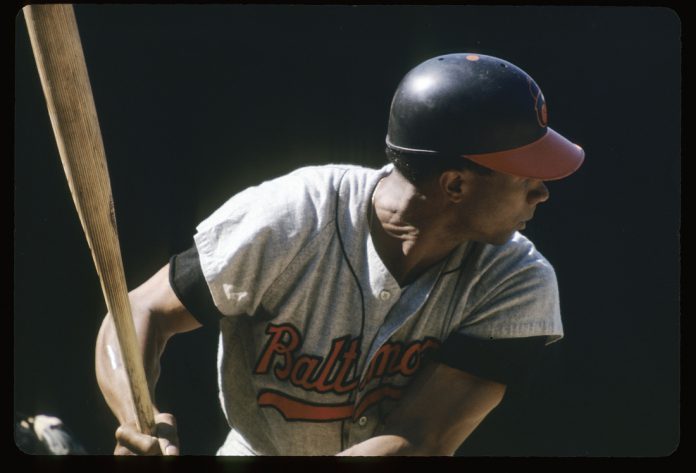
The legend was 83. His number 20 is forever revered and retired and his statue stands for all time at Camden Yards.
His friend Roy Firestone wrote two piece for us.
“When I was batboy for the Baltimore Orioles in Miami, things didn’t start in the clubhouse till someone said, “Frank is here”.
“Frank”, of course, was Frank Robinson, future Hall of Famer, one of baseball’s greatest players ever, and the leader of the team.
There were great names in that locker room, and a few would also someday be Hall Of Famers too.
Brooks Robinson, Jim Palmer, later Eddie Murray, and of course, manager Earl Weaver.
But there was only one “Frank”.
Frank came “here”, in Baltimore in 1966.
He was traded away after the Cincinnati Reds GM called him “an old 30.”
Frank would use that comment to motivate him, empower him.
“When I saw him double down the right field line on the first day of Spring Training, I told Dick Hall, “we just won the pennant with that guy.”.
He wasn’t wrong.
Robinson won the Triple Crown and led the Orioles to their first world championship that year.
As a ball player Robinson had few peers.
Mantle was the bigger name and more beloved.
Clemente was more graceful and elegant.
Musial a better hitter.
Mays and Aaron were more complete players.
But Frank Robinson was something that those others were not.
He was a fierce warrior.
Frank Robinson walked into that locker room and you could feel it.
“Frank’s here”, yelled Paul Blair when Robinson came into the clubhouse.
You knew who was in charge.
You knew immediately who had command of that locker room.
Frank was funny, sarcastic, acerbic, critical, uncensored, wise, and a true baseball sage.
Earl Weaver, who confronted almost anyone, would never confront Frank.
Weaver knew you don’t mess with a warrior.
Frank Robinson’s statistics were among the greatest in baseball history , but mere numbers can’t define the leadership, authority, and influence this man had.
No one else was Most Valuable player in both the National and American league.
No one else was manager of the year in both leagues.
Frank Robinson was the first black manager in major league baseball, and he homered in his first at bat as a player manager too.
He was a lion of a man.
A figure who led, influenced, empowered, and inspired his teammates to win.
I remembered the game when he hit the longest home run at Memorial Stadium, the game where he hit TWO grand slams, the catch falling into the right field stands in New York.
But no one moment defines Frank Robinson better than beating the tag at home plate in the winning run in game 6 of the 1971 World Series.
It was a metaphor for the player he was.
Frank Robinson was determined and aggressive and would not be denied.
It was the last World Series Robinson would ever play in. Robinson played that game like he know he’d never have another chance.
Frank Robinson was, like his predecessor who shared his last name, Jackie Robinson, strong willed, courageous, stubborn, and single minded.
Like Jackie he broke down barriers, pushed convention, and demanded to be respected and heard.
He didn’t just “come to play” he came to win.
Talent was only part of it.
Will was certainly most of it.
There was a fire that burned within him and it spilled over onto the field…
He brawled with Eddie Mathews on the field.
He slid hard on the base paths, taking all he endured and suffered as a black man in baseball in the 50’s and early 60’s and exorcised his demons on the field of play.
He challenged teammates.
He insulted teammates.
He made them laugh and he made them competitively angry.
He was a critic, and advocate and activist for his teammates and the game of baseball to do better.
He offended some…and uplifted many.
Once, when he was Giants manager, he went to the mound and asked for the ball from the pitcher he was taking out of the game.
The pitcher “flipped” it to him.
Robinson grabbed the pitcher on the mound and said “don’t you EVER flip a ball to me again…or I’ll knock you on you ass right here on the mound in front of everyone.”
Robinson demanded respect…and like Jackie, he didn’t much care if you liked him or not.
You WOULD respect him.
I can’t say Frank Robinson was an easy man.
He led a hard life in his youth, never knew his father, lived in poverty…and shared injustice with his high school basketball teammates Bill Russell(yes, THE Bill Russell) Curt Flood, and Vada Pinson.
When he came to Baltimore he couldn’t live in any white areas…but Brooks Robinson helped him find a home for Robinson’s family, and Frank never forgot Brooks’ kindness and help. When he lay dying Brooks called him and the two chatted with mutual respect and gratitude…
Frank Robinson was a force on nature…
He never stepped back.
He never stepped away from a challenge.
I saw his first at bat as an Oriole when he played in his first game in Spring Training.
On the first pitch, he hit a ball over the clock at Miami Stadium about 500 feet away.
The Orioles had arrived.
“Frank was here”.
His loss to baseball is profound.
There were greater players…but not many.
There weren’t many who had a greater impact on the game and his like will never be seen again.
He was one of a kind.
“Frank WAS…here”
—–
Robinson brothers to the end
“He was born in segregated Little Rock Arkansas in 1937.
Jim Crow laws didn’t allow blacks and white to mingle almost anywhere.
He was an aspiring baseball player, who never even knew a black man except for a man named Sonny, who oversaw his little league park where he played.
That was the only black man he had ever met.
He never played baseball with a black player…until things changed with the Little Rock Nine.
The Little Rock Nine was a group of nine African American students enrolled in Little Rock Central High School in 1957, which was a seminal moment in the Civil Rights movement.
This young man never really understood prejudice.
His father was a decent and kind man, instilling respect and honor to his sons… and the young man and his brothers would eventually play against, but not with, black players.
He left Little Rock to play pro baseball…the same year Little Rock became a center of racial tension and change….
His name was Brooks Calvert Robinson, and he never even knew a black man in baseball he would call a close friend.
He was born in segregated Texas, moved to Oakland, California after his father abandoned the family, and he endured unbelievable racial hatred.
He enrolled at McClymonds High School in Oakland, hoping to play pro basketball or baseball.
His high school teammates were Bill Russell, who became an NBA legend, Curt Flood, who would eventually challenge the reserve clause in Major league baseball, and perennial All Star Vada Pinson.
HIS name was Frank Robinson, and he went to the big leagues, becoming an instant star for the Cincinnati Reds, earning Rookie of the Year honors.
In December 1965, Frank Robinson was traded to the Baltimore Orioles, and both men’s lives would change forever.
Brooks and Frank Robinson, the “Robinson Boys”.
Baltimore was mostly segregated in 1966, Frank’s first year in Baltimore…but Brooks, remembering his father’s tolerance and kindness, made his new teammate feel at home.
Then he grew to understand what racial prejudice really was.
“When Frank came to Baltimore”, Brooks told me tonight, “I saw things I couldn’t believe. He couldn’t rent a decent apartment, he couldn’t buy a house.
So I put my name “Robinson” on a down payment for a house.
They thought the “Robinson” was me.
But it was for Frank.
When the realtors found out it was for this new black player…well, lets say the deal magically fell through”.
I was angry for Frank.
Angry for his pain.
And for the first time in my life…I came to understand how bigotry caused pain and suffering for people…especially a family”.
Frank Robinson, thanks to Brooks’ insistence and name got a modest home in Baltimore…and Frank Robinson, for the rest of his life grew to love and admire…the “other Robinson” .
They led their teams to two world titles, and played in 5 World Series together.
In the first inning of the first World Series the Orioles ever played in, Frank and Brooks Robinson hit back to back home runs…and their story became legend.
They won that World Series over the Dodgers in a four game sweep.
Brooks Robinson called Frank early last week.
His old friend and teammate was dying of bone cancer.
‘When I got on the phone with him, his voice was thin.
I told him I was praying for him.
I told him that I loved him. But I knew I would never speak to him again. Just as I said goodbye on the phone, I got choked up. I knew it was the final goodbye.”
Brooks and Frank Robinson were inexorably linked in baseball history…but their friendship was authentic and the two families were deeply close..until the end.
“You can’t really understand the hardships that people have in their lives unless you walk in their shoes”, said Brooks to me Thursday night.
“He led by example and he led his team in ways I didn’t…and couldn’t”.
“I knew he was the greatest player I ever played with”, he said, “but more than that, he was one of the greatest men I ever knew.”
Brooks Robinson and Frank Robinson.
The ‘Robinson Boys” , couldn’t have been different in personality or style.
But baseball brought them together.
They played the game as teammates and learned that great teammates and great friends brought out the best in each other.
“I’ll really miss Frank. He had a great life. He had a hard life. But he made the game batter, he made his team a champion, and he made my life so much better”.
I’m a better man for having known him,” said Brooks.
As I hung up the phone, I remembered a famous quote by humanitarian, Albert Schweitzer who put it this way:
“In everyone’s life, at some time, our inner fire goes out. It is then burst into flame by an encounter with another human being. We should all be thankful for those people who rekindle the inner spirit.
Brooks and Frank. Their inner spirits will be intertwined for eternity.”
























